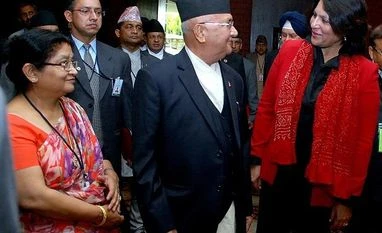Veteran Communist leader K P Sharma Oli kindled hopes for much-needed political stability in Nepal when he assumed power for the second time in 2018 after the Left alliance swept the historic parliamentary polls.
However, his surprise move to recommend the dissolution of Parliament after weeks of power tussle within the ruling Nepal Communist Party dashed all hopes, once again created political instability and paved the way for a possible split in the largest communist party of the country.
Oli, who joined politics as a student activist in his teenage and spent 14 years in jail for opposing the now-abolished monarchy, became Nepal's Prime Minister for a second time in 2018 as a joint candidate of the Left alliance.
The alliance between the CPN (Unified MarxistLeninist) and Pushpa Kamal Dahal-led CPN (Maoist Centre) won a majority in the House of Representatives and in six of the seven provincial assemblies in the 2017 elections. After their victory, the two parties formally merged in May 2018.
Known for his pro-China stance, 68-year-old Oli had earlier served as the country's prime minister from October 11, 2015 to August 3, 2016 during which Kathmandu's ties with New Delhi had strained.
During his first term, Oli had publicly criticised India for interfering in Nepal's internal matters and accused it of toppling his government. He, however, promised to forge a partnership with India to move forward the country towards the path of economic prosperity ahead of assuming office for the second term.
In 2015, when Nepal adopted a new Constitution that split it into seven states, the ethnic Madhesi group, mostly of Indian-origin, protested for months, saying they were not getting enough territory in one of the provinces and were also facing discrimination. The issue had strained Indo-Nepal ties.
Also Read
During his second term, Oli claimed that efforts were being made to oust him after his government redrew Nepal's political map by incorporating three strategically key Indian territories, a move that strained ties between the two countries.
India had termed as "untenable" the "artificial enlargement" of the territorial claims by Nepal after its Parliament unanimously approved the new political map of the country featuring Lipulekh, Kalapani, and Limpiyadhura areas which India maintains belong to it.
Oli accused his rivals within the party of making efforts to topple his government.
The NCP, formed after the merger between Oli led CPN-UML and Prachanda led CPN (Maoist Centre), is divided along the two factions led by the two leaders.
The Prachanda faction enjoys a majority in the nine-member Secretariat, the highest decision-making body of the party and Oli's move paved the way for a possible split in the party.
Born on February 22, 1952 at Terathum of Eastern Nepal district, Oli is the eldest child of Mohan Prasad and Madhumaya Oli. He was raised by his grandmother after his mother died of smallpox.
He left his school in Class 9th and joined politics. He, however, did Intermediate level in Arts from jail later. His wife, Rachana Shakya, is also a communist activist and the two had met in the course of party activities.
Oli started his political career as a student activist in 1966 by joining the fight against the autocratic Panchayat System under the direct rule of the King.
He joined the Communist Party of Nepal in February 1970. He went underground soon after taking the party's membership. The same year, he was arrested for the first time by the Panchayat government.
In 1971, he took leadership of Jhapa Rebellion which was initiated by beheading landlords in the district.
Oli is one of the few political leaders of Nepal who spent several years in jail. He was imprisoned for 14 consecutive years from 1973 to 1987.
After his release from prison, he became a central committee member of UML in-charge of the Lumbini Zone until 1990.
Following 1990 democratic movement that brought down the Panchayat regime, Oli became a popular name in the country. In 1991, he became the founding chairman of Prajatantrik Rastriya Yuwa Sangh. A year later, he became the party's publicity department chief and established himself as a key figure in Nepali politics.
He was elected as a member of the House of Representatives for the first time from Jhapa district in 1991. Oli had also served as the minister of home affairs in 19941995. He was re-elected to the House of Representatives from Jhapa electorate no 2 in 1999.
He had served as deputy prime minister during the interim government led by Girija Prasad Koirala in 2006 after the successful conclusion of the second Peoples Movement.
Oli was elected as leader of the CPN-UML Parliamentary Party in the Second Constituent Assembly on February 4, 2014, defeating party chairman Jhala Nath Khanal.
(Only the headline and picture of this report may have been reworked by the Business Standard staff; the rest of the content is auto-generated from a syndicated feed.)
)